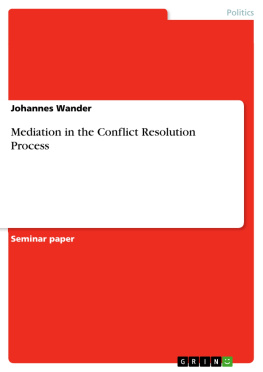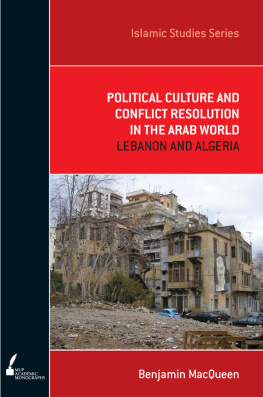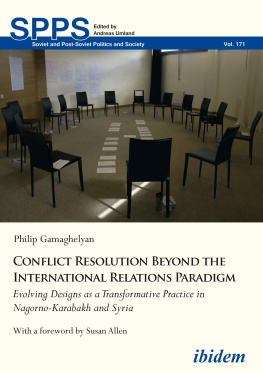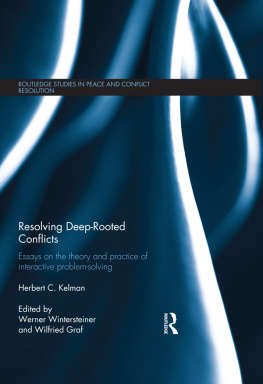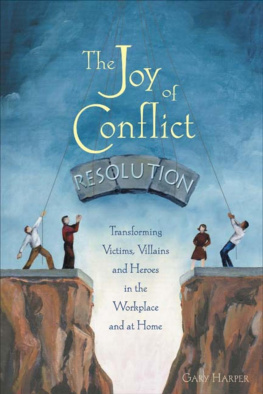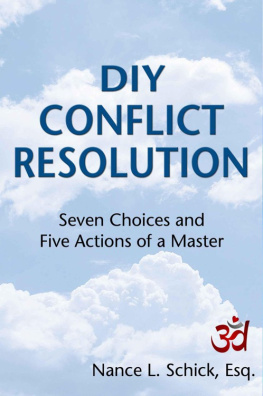First published 2013 by Paradigm Publishers
Published 2016 by Routledge
2 Park Square, Milton Park, Abingdon, Oxon OX14 4RN
711 Third Avenue, New York, NY 10017, USA
Routledge is an imprint of the Taylor & Francis Group, an informa business
Copyright 2013, Taylor & Francis.
All rights reserved. No part of this book may be reprinted or reproduced or utilised in any form or by any electronic, mechanical, or other means, now known or hereafter invented, including photocopying and recording, or in any information storage or retrieval system, without permission in writing from the publishers.
Notice:
Product or corporate names may be trademarks or registered trademarks, and are used only for identification and explanation without intent to infringe.
Avruch, Kevin.
Context and pretext in conflict resolution : culture, identity, power, and practice / Kevin Avruch.
p. cm.
Includes bibliographical references and index.
ISBN 978-1-61205-060-7 (paperback : alk. paper)
1. Culture conflict. 2. Social conflict. 3. Conflict management. I. Title.
HM1121.A88 2012
303.6dc23
2011042235
Designed and Typeset by Straight Creek Bookmakers.
ISBN 13 : 978-1-61205-059-1 (hbk)
ISBN 13 : 978-1-61205-060-7 (pbk)
The Return of Culture to Conflict Analysis and Resolution
In the mid-1980s the idea that culture was important for understanding and responding to conflict was largely dismissed by policy makers, practitioners, and scholars outside of anthropology. It hadnt always been this way. At the mid-twentieth century, the idea that cultures mattered was prevalent. In the United States, regional differences in beliefs, behaviors, and values were widely acknowledged and provided material for radio and movie entertainments. During World War II, the U.S. military produced handbooks and guides to help its expeditionary forces understand and engage the island cultures they would encounter in the Pacific, and cultural guidance helped define the ways that the victorious allies dealt with Germany and Japan.
But as the Cold War deepened, this awareness of culture was eclipsed by the belief in the power of the melting pot and the rise of faith in technical knowledge. In international relations, the approaches that rose to prominence during this period stressed state actions and treated states as acultural rational actors that could most effectively be dealt with through coercive means, especially military force and economic sanctions. The idea that cultures mattered got pushed aside as it became common wisdom that cultural difference was dissolving in the face of greater interpersonal contacts spurred on by remarkable developments in travel and technology. Airplanes traversed distances in hours that previously took weeks to travel. Television and telephones brought people together in ways, often quite intimate, not possible before. As well, domestic differences and international activities all came to be refracted through the grand contest between East and West, which envisioned a great struggle between only two different value systems vying for supremacy. Then too, the very real possibility that this competition would lead to a nuclear holocaust ending human life as we knew it and the desire to avert such destruction were seen as amendable to technical solutions, making concerns with culture seem inconsequential.
It is not surprising, perhaps, that in such a context conflict analysis and resolution too should be seen as in need of technical expertise, not cultural understanding and interpretation, which was often derided as a nave waste of time, if not soft-headed or morally mistaken. Game theory models were elaborated to guide the conduct of international strategy, even including finely calibrated scenarios for nuclear war, in which escalation would be limited by the use of nuclear bombs of varying destructive force to send finely calibrated messages about national intentions. Overtaxed court systems were to find relief in the creation of an alternative dispute resolution system that relied on technical skills in negotiation and mediation to efficiently process a myriad of disputes that were said to be clogging the court system.
By the early 1980s, the view that most any conflictdomestic or international, intergroup or interpersonalcould be reframed and negotiated to a satisfying conclusion if only the right technical skills were brought to bear on it had become part of the popular imagination. Books championing such technical approaches regularly appeared on bestseller lists. This was soon followed by the growth of a cottage industry promoting those approaches. Quickly, the cottage industry gave way to larger enterprises consuming millions of dollars in executive seminars, policy advisory groups, and training programs promoting and prescribing these technical approaches to conflict management throughout the world, all largely without concern for how cultural differences might affect those activities.
Yet even as the possibility that all conflicts might yield to skilled application of technical knowledge assuaged the popular imagination, some scholars and analysts were sounding alarms about the dangers of a culture-free conception of conflict. And we began to push back against the received view that conflicts required only mechanically technical solutions.
Internationally, in the late 1980s and 1990s as the Cold War came to an end, conflicts that had been controlled by the power and patronage of the Soviet Union or the United States reemerged, sometimes with the most deadly consequences. Countries shattered; Yugoslavia split apart; Somalia became a failed state. Ethnic cleansinga polite euphemism for genocideravaged places as different as Rwanda and the former Yugoslavia. Within the United States, the reassertion of cultural difference was evident in the rise of value politics, often revealing sweeping and stunning antipathies within our society.
These changes led analysts to see that culture is important. Yet, the approach to culture that got taken up was itself a mechanical and outdated one. Those of us who had urged the importance of culture for understanding and responding to conflicts pointed out the dangers of treating dynamic cultural systems as stable, unchanging things that could be given mechanical treatment. The critiques took issue with the mechanical use of culture and the many ways in which it resulted in distorted understandings of events. A good deal of this work was being done by anthropologists writing on peace, conflict, and security under the auspices of the Commission on Peace and Human Rights of the International Union of Anthropological and Ethnological Sciences, of which I was the executive secretary. It was in that context that I first came to know and admire Professor Kevin Avruch and his contributions to these debates. After a sabbatical year at the United States Institute of Peace, Kevin published his 1998 book, Culture and Conflict Resolution, which crystallized and extended those critiques in a way that made them accessible and relevant to policy makers, analysts, and scholars alike.


